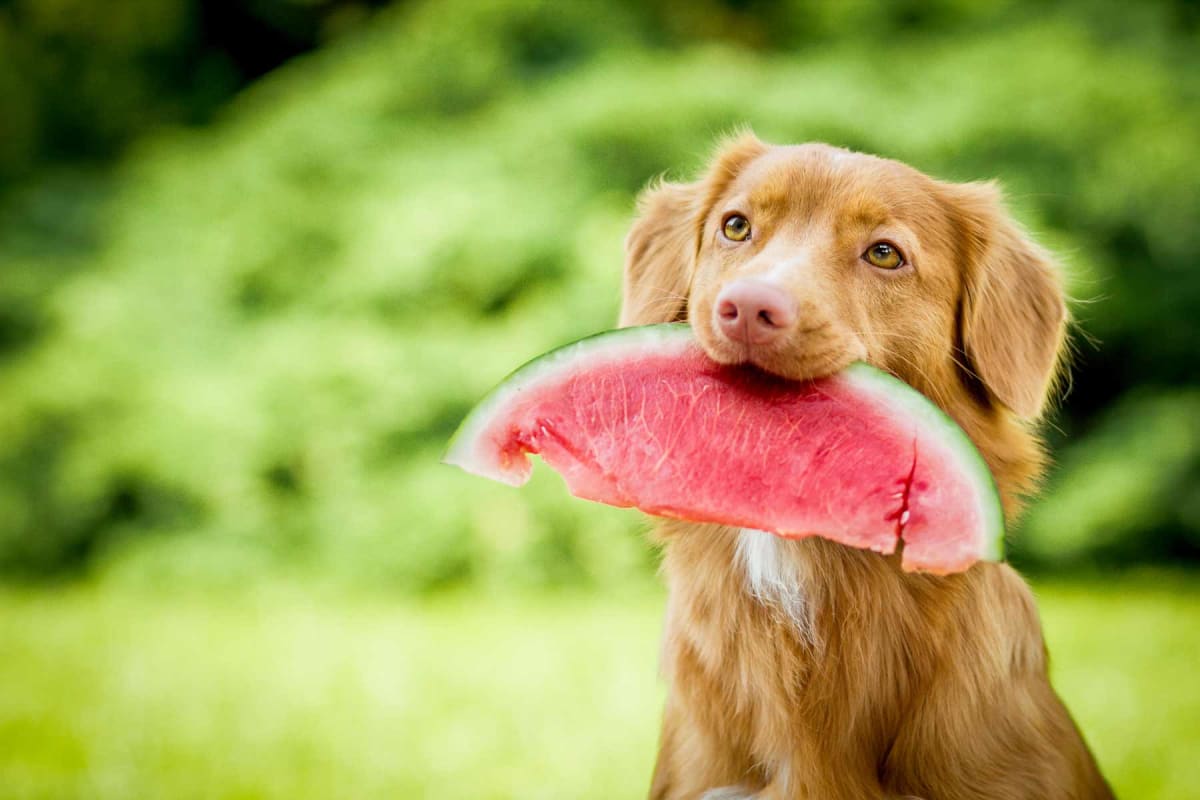
Can dogs eat watermelon?
Can dogs eat watermelon?
Can dogs have watermelon?
Dogs can absolutely have watermelon, as long as you prepare it correctly. Watermelon flesh is safe and nutritious for dogs to eat. This hydrating fruit makes an excellent treat, especially during hot summer months when your dog might need extra hydration. Read on for everything you need to know before adding watermelon to your dog's treat rotation.
Can puppies eat watermelon?
Puppies can eat watermelon, but with extra caution. Their digestive systems are more sensitive than adult dogs, so introduce watermelon slowly and in very small amounts. Monitor your puppy closely after they eat watermelon for the first time.
For puppies, it's especially important to remove all seeds and rinds, as their smaller size makes them more vulnerable to intestinal blockages. Start with just a tiny piece to see how they react before offering more.
Is watermelon good for dogs?
Watermelon offers several health benefits for dogs and can be a tasty, nutritious treat when given in moderation. This fruit is packed with beneficial nutrients that support your dog's overall health:
Hydration: With 92% water content, watermelon helps keep your dog hydrated, especially during hot weather.
Vitamins: Rich in vitamins A, B6, and C, watermelon supports immune function, vision, and skin health.
Antioxidants: Lycopene may support heart health and reduce the risk of certain cancers in dogs, while beta carotene helps keep the eyes healthy and bolsters immunity.
Potassium: Watermelon contains potassium, which helps support heart and muscle function.
Fiber: The fruit's high fiber content promotes good digestion and gut health.
Low calories: At only about 50 calories per cup, watermelon treats won't pack pounds onto your pup.
Can dogs eat watermelon rinds?
No, dogs should not eat watermelon rinds. The tough, green outer skin and white rind sections of the watermelon can cause gastrointestinal upset, including vomiting and diarrhea. In some cases, large pieces of rind can even cause intestinal blockages, which is a serious medical emergency.
Always remove the rind completely before offering watermelon to your dog. If your dog manages to eat watermelon rind, monitor them closely and contact your vet if you notice any signs of distress.
Can dogs eat watermelon seeds?
No, dogs should not eat watermelon seeds. The seeds can potentially cause an intestinal blockage, especially in smaller dogs. Even a few seeds might be problematic for small breeds, while larger dogs might handle an occasional seed without issue.
For safety, it's best to completely remove all seeds before giving watermelon to your dog. Seedless watermelon varieties are a convenient option, though you should still check for any stray seeds.
When is watermelon bad for dogs?
While watermelon is generally safe for dogs after removing the rinds and seed, there are situations when the watermelon flesh itself can be harmful:
Dogs with diabetes should avoid watermelon due to its sugar content.
Some dogs may have allergies or sensitivities to watermelon, so always introduce new foods slowly and watch for any adverse reactions like itching, wheezing, or digestive upset.
Feeding your dog too much watermelon can cause diarrhea or upset stomach due to its high water and fiber content.
How to serve watermelon to your dog
To safely serve watermelon to your dog, start by washing the fruit thoroughly. Cut it into small, bite-sized pieces appropriate for your dog's size, removing all seeds and rinds. Some creative ways to serve watermelon to your dog include:
Fresh cubes: Simple bite-sized pieces as an occasional treat
Frozen chunks: Perfect for hot summer days
Watermelon puree: Blended and frozen in ice cube trays for refreshing "watermelon ice cream" bites
Mixed with regular food: Small amounts added to their regular meal as a special topper
Always supervise your dog when giving them watermelon to ensure they don't choke on larger pieces.
How much watermelon can you feed your dog?
Watermelon should be given as an occasional treat, not as a regular part of your dog's diet. A good general guideline is to follow the 10% rule: treats, including watermelon, should make up no more than 10% of your dog's daily calorie intake.
For most dogs, this translates to a few small cubes of watermelon. The exact amount varies based on your dog's size. Consult your veterinarian to determine the right portion size for your specific dog.

Introducing watermelon to your dog's diet
When introducing watermelon to your dog for the first time, start slowly. Offer just a small piece and observe how your dog reacts. Some dogs may have sensitive stomachs or allergies to new foods.
Watch for any signs of digestive upset, such as:
Diarrhea
Vomiting
Lethargy
Loss of appetite
If your dog shows any negative reactions, stop feeding them watermelon and consult your veterinarian. If they tolerate it well, you can gradually incorporate it as an occasional treat.
Other safe fruits
Besides watermelon, many other fruits are safe for dogs to eat as an occasional treat, but others can be dangerous. The following table provides a short list of some safe fruits for dogs as well as some fruits that are not safe for dogs to eat.
| Safe fruits | Toxic fruits |
|---|---|
|
|